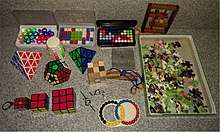Puzzle
| Part of a series on |
| Puzzles |
|---|
 |
A puzzle is a game, problem, or toy that tests a person's ingenuity or knowledge. In a puzzle, the solver is expected to put pieces together in a logical way, in order to arrive at the correct or fun solution of the puzzle. There are different genres of puzzles, such as crossword puzzles, word-search puzzles, number puzzles, relational puzzles, or logic puzzles.
Puzzles are often created to be a form of entertainment but they can also arise from serious mathematical or logistical problems. In such cases, their solution may be a significant contribution to mathematical research.[1]
Etymology
The 1989 edition of the Oxford English Dictionary dates the word puzzle (as a verb) to the end of the 16th century. Its first documented use (to describe a new type of game) was in a book titled The Voyage of Robert Dudley...to the West Indies, 1594–95, narrated by Capt. Wyatt, by himself, and by Abram Kendall, master (published circa 1595). The word later came to be used as a noun.
The word puzzle comes from pusle, meaning "bewilder, confound", which is a frequentive of the obsolete verb pose (from Medieval French aposer) in the sense of "perplex". The use of the word to mean "a toy contrived to test one's ingenuity" is relatively recent (within mid-19th century).
Genres

Puzzles can be divided into categories. For example, a maze is a type of tour puzzle. Some other categories are construction puzzles, stick puzzles, tiling puzzles, disentanglement puzzles, lock puzzles, folding puzzles, combination puzzles, and mechanical puzzles.
- A chess problem is a puzzle that uses chess pieces on a chess board. Examples are the knight's tour and the eight queens puzzle.
- Jigsaw puzzles.
- Lateral thinking puzzles, also called "situation puzzles"
- Mathematical puzzles include the missing square puzzle and many impossible puzzles — puzzles which have no solution, such as the Seven Bridges of Königsberg, the three cups problem, and three utilities problem
- Mechanical puzzles such as the Rubik's Cube and Soma cube
- Metapuzzles are puzzles which unite elements of other puzzles.
- Paper-and-pencil puzzles such as Uncle Art's Funland, connect the dots, and nonograms
- Also the logic puzzles published by Nikoli: Sudoku, Slitherlink, Kakuro, Fillomino, Hashiwokakero, Heyawake, Hitori, Light Up, Masyu, Number Link, Nurikabe, Ripple Effect, Shikaku, and Kuromasu.
- Peg solitaire
- A puzzle box is a puzzle that can be used to hide something — jewelry, for instance.
- Rubik's Cube and other combination puzzles can be stimulating toys for children or recreational activities for adults.
- Sangaku (Japanese temple tablets with geometry puzzles)
- Sliding puzzles (also called sliding tile puzzles) such as the 15 Puzzle. Puzz-3D is a three-dimensional variant of this type.
- Sokoban
- Spot the difference
- Tangram
- Word puzzles, including anagrams, ciphers, crossword puzzles, Hangman (game), and word search puzzles. Tabletop and digital word puzzles include Bananagrams, Boggle, Bonza, Dabble, Letterpress (video game), Perquackey, Puzzlage, Quiddler, Ruzzle, Scrabble, Upwords, WordSpot, and Words with Friends. Wheel of Fortune (U.S. game show) is a game show centered on a word puzzle.
Puzzle solving
Solutions of puzzles often require the recognition of patterns and the adherence to a particular kind of ordering. People with a high level of inductive reasoning aptitude may be better at solving such puzzles than others. But puzzles based upon inquiry and discovery may be solved more easily by those with good deduction skills. Deductive reasoning improves with practice.
Puzzle Makers
Puzzle makers are people who make puzzles.
Some notable creators of puzzles are:
History of Jigsaw Puzzles
Jigsaw puzzles are perhaps the most popular form of puzzle. Jigsaw puzzles were invented around 1760, when John Spilsbury, a British engraver and cartographer, mounted a map on a sheet of wood, which he then sawed around the outline of each individual country on the map. He then used the resulting pieces as an aid for the teaching of geography.
After becoming popular among the public, this kind of teaching aid remained the primary use of jigsaw puzzles until about 1820.[2]
The largest puzzle (40,320 pieces) is made by German game company Ravensburger.[3] The smallest puzzle ever made was created at LaserZentrum Hannover. It is only five square millimetres, the size of a sand grain.
History of other puzzles
By the early 20th century, magazines and newspapers had found that they could increase their readership by publishing puzzle contests, beginning with crosswords and in modern days sudoku.
Organizations and events
There are organizations and events that cater to puzzle enthusiasts, such as:
- World Puzzle Championship
- National Puzzlers' League
- Ravenchase
- Puzzlehunts such as the Maze of Games.
See also
References
- ↑ Kendall G.; Parkes A.; and Spoerer K. (2008) A Survey of NP-Complete Puzzles, International Computer Games Association Journal, 31(1), pp 13–34.
- ↑ History of Jigsaw Puzzles The American Jigsaw Puzzle Society
- ↑ "The worlds biggest Puzzle | Ravensburger". www.ravensburger.us. Retrieved 2018-06-23.
External links
| Wikiquote has quotations related to: Puzzle |
| Wikibooks has a book on the topic of: Puzzles |
| Look up puzzle in Wiktionary, the free dictionary. |